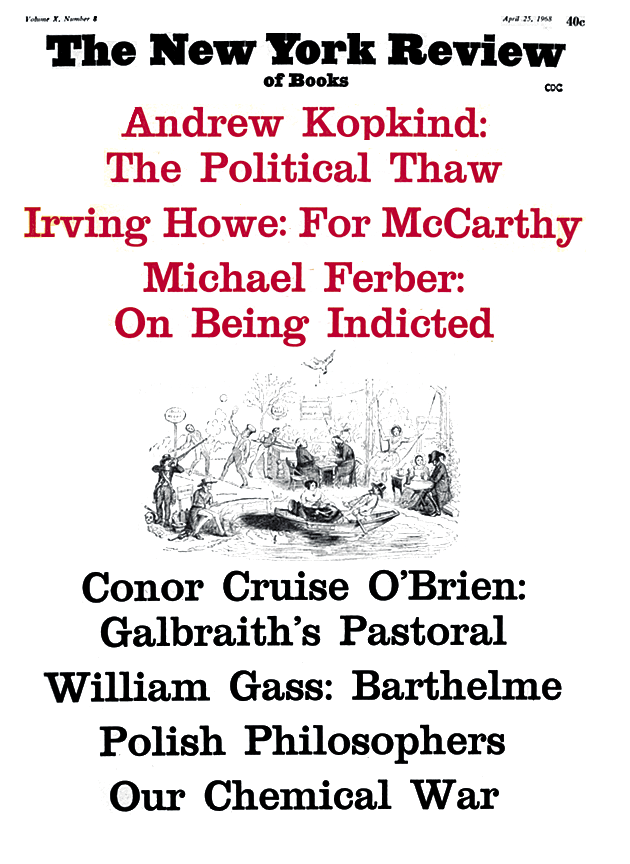In response to:
Gibbon Made Simple from the December 21, 1967 issue
To the Editors:
I am not surprised that several of your readers objected to H. R. Trevor-Roper’s review [NYR, Dec. 21, 1967] of J. W. Swain’s Gibbon; for it was not a review of the book at all, but simply a slating of the elderly American professor for having dared to write it. Whatever the book’s shortcomings, if Trevor-Roper had any justice of mind he would have seen that the book had several new points to make which were enlightening.
1) Swain brings out that we had accepted Gibbon’s account of his education at Oxford too literally. He profited more from his reading there than he ever allowed. 2) Swain also shows how much more important Gibbon’s conversion to and revulsion from Catholicism were in his life than he admitted. We ought to have realized that, but I have never seen it so well brought out as in Swain’s book. 3) Similarly with Gibbon’s relationship with Suzanne Curchod, later Mme. Necker—far more significant than Gibbon’s account of it in the Memoir.
Swain also shows the importance of the contemporary conflict of the British Empire with the American Colonies upon the development and shaping of The Decline and Fall of the Roman Empire.
None of this appeared in TrevorRoper’s “review,” not even a proper criticism where Swain was at fault—for example, in his too unfavorable estimate of Gibbon’s patron, the first Lord Eliot. Too lofty to take any notice of what the book actually accomplished—in fact, it was very well worth publishing by St. Martin’s Press—Trevor-Roper was simply concerned with “Rescuing Gibbon” from the despised American professor.
No doubt Trevor-Roper felt that he could have written the book better. Then why does he not do it, instead of so much “smart-alec” journalism; and, if he must review a work of patient scholarship, which has new and useful contributions to make, why does he not at least approach it with some justice of mind?
We can all perceive, and enjoy, Trevor-Roper’s self-identification with Gibbon. The only difference is that Gibbon wrote The Decline and Fall. And what, pray, has Trevor-Roper to show for it at a comparable age?
A.L. Rowse
All Souls College
Oxford
H.R Trevor-Roper replies:
That Mr. Swain makes some peripheral observations which are sound enough, I do not deny. As Gibbon himself once quoted from Uncle Pliny, “nullum esse librum tam malum ut non ex aligna parte prodesset.” * But, as I wrote, I cannot find any such observation in his book that has not already been made in previous works of scholarship, apparently unfamiliar to Dr. Rowse. The only original part of Mr. Swain’s pretentious little book is its central thesis, viz: that Gibbon had no originality of mind, his historical philosophy being merely a discontinuous rationalization of his social ups and downs. I have shown, patiently enough, that Mr. Swain has made no attempt to understand Gibbon’s philosophy and that he consistently misrepresents biographical episodes in order to sustain his misunderstanding. I have done this in detail (Dr. Rowse seems hardly to have read my review), because I believe that the review of what claims to be a new and original work of scholarship should examine what is new and original in its original thesis—not merely paddle in the margin.
I admire Gibbon and obviously know more about him than Dr. Rowse, but it has never occurred to me to identify myself with him, any more than Dr. Rowse (I presume) would identify himself with Shakespeare or Queen Elizabeth; so I shall charitably overlook the good doctor’s concluding irrelevancies.
This Issue
April 25, 1968
-
*
If translation is needed: “No book so bad but some part may be of use.” ↩


